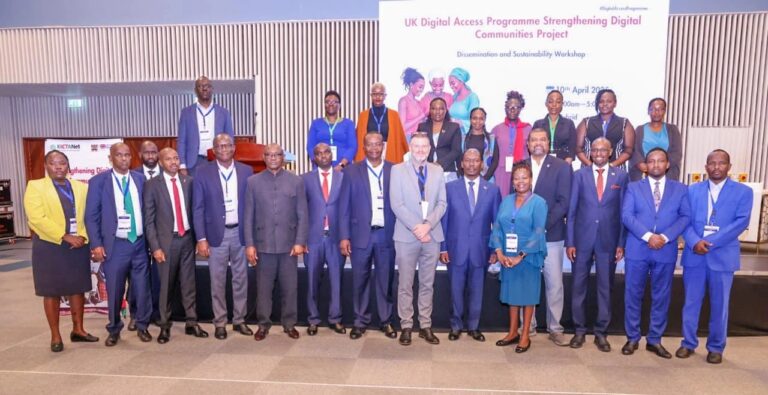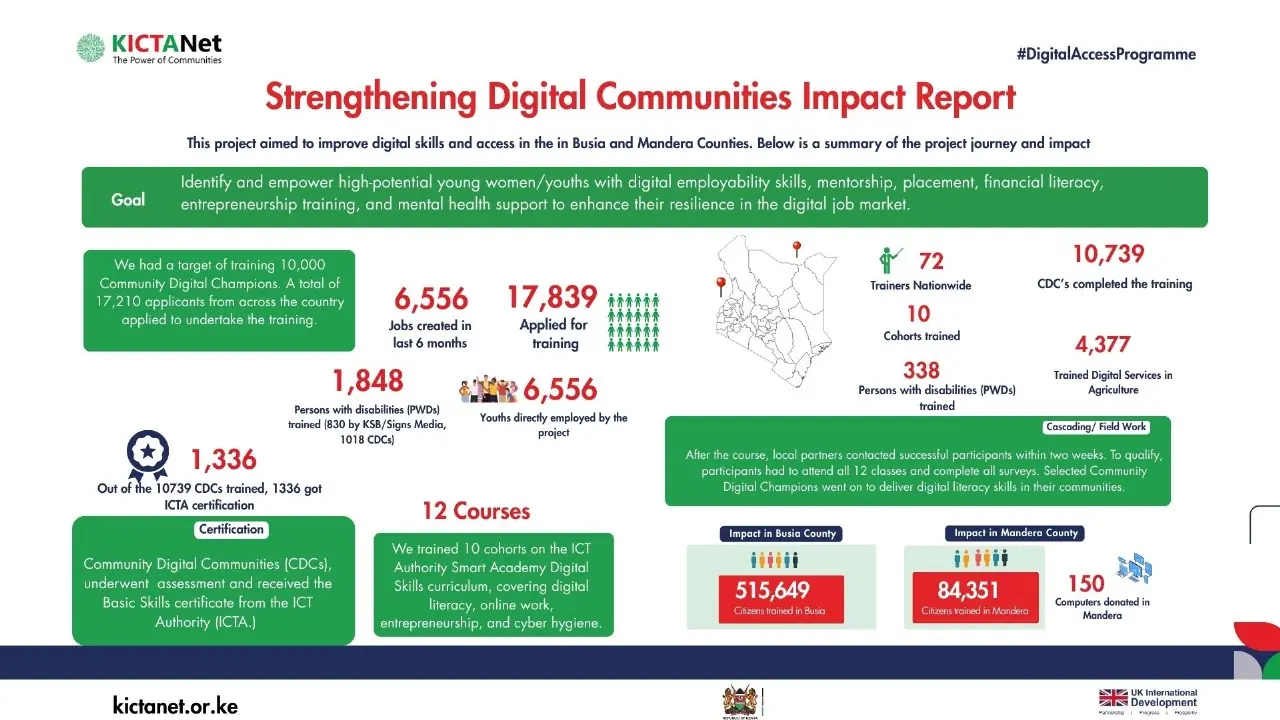KICTANet, in partnership with the UK government and local stakeholders, completed the Strengthening Digital Communities (SDC) Project.
The initiative equipped over 600,000 citizens in Mandera and Busia counties with foundational digital skills, promoting digital inclusion and economic empowerment.
A Dissemination and Sustainability Planning Workshop in Nairobi convened over 150 stakeholders, including government officials, private sector representatives, development organizations, civil society members, and beneficiaries from Mandera and Busia, to review outcomes and plan for sustained impact.
Launched in September 2024, the project prioritized marginalized groups—women, girls, youth, people with disabilities, farmers, and small business owners—bridging the digital divide through community-driven technology adoption.
The project’s impact offers valuable insights as Kenya plans to expand digital skills training nationwide, building on SDC’s successes and lessons learned.
Community Impact and Scalable Success
The SDC project bridged the digital divide through community-driven technology adoption, using multilingual engagement to reach diverse populations. Beneficiaries reported enhanced livelihoods: farmers accessed market data, traders expanded customer bases, and entrepreneurs scaled businesses using digital tools.
- Sandis Wamalwa (Busia) overcame unemployment through training in digital marketing, AI-powered graphic design, and web development via the UK Digital Access Programme’s “Soko Plug” by Sote Hub. He now runs a digital workstation, supports local businesses with branding, and mentors peers.
- Said Haji (Mandera) grew Qarni Studios by launching a professional website (qarni-studio.odoo.com) and a TikTok account with 26,700 followers and 430,500 likes, boosting leads for photography and web development services.
The project’s achievements provide a blueprint for Kenya’s national digital skills expansion, now scaling to counties like Garissa and Turkana. Key SDC outcomes include:
- Training 10,739 Community Digital Champions (CDCs) as local facilitators, a model prioritized for nationwide engagement.
- Equipping over 2,000 youth with advanced digital employability skills, including mentorship and entrepreneurship training.
- Donating 150 computers to Mandera County, fitted with assistive software for visually impaired users, enhancing access to digital platforms and government services.
National Vision for Digital Empowerment
Kenya’s national program builds on SDC’s success, prioritizing foundational digital skills for all citizens, with a focus on empowering farmers, traders, and small business owners. It emphasizes:
- Multilingual awareness campaigns to engage non-Swahili and non-English speakers.
- Investment in computer labs, affordable power, and internet access in underserved counties.
- Community-centric training led by CDCs to ensure sustainability.
Dr. Grace Githaiga, KICTANet CEO, stated, “This workshop is a testament to the transformative power of digital inclusion,” stated Dr. Grace Githaiga, CEO of KICTANet.
“We are excited to share the project’s success and collaborate with our partners to ensure these gains are sustained and expanded, ultimately empowering more Kenyans to thrive in the digital age.”
Innovating with AI and Inclusion
The SDC project supported the UK-Kenya AI Challenge Fund, delivering 11 joint projects, including
- Policy Priority Inference (PPI) Framework: Developed by the Kenya National Bureau of Statistics (KNBS), Jomo Kenyatta University, the Institute for Development Studies, and the UK’s Alan Turing Institute, this AI-based tool aids policymakers in prioritizing public resource allocation for evidence-based socioeconomic outcomes.
- Enhanced Statistical Data Access: A collaboration between KNBS and the UK Office for National Statistics (ONS) leverages AI and machine learning to improve statistical data accessibility, enhancing data-driven policymaking.
The national strategy will leverage inclusive AI to address ICT challenges, aligning with SDC’s innovation focus.
Support for People with Disabilities
Over 6,000 people with disabilities benefited through partnerships with the Kenya Society for the Blind and Signs Media Kenya. The AssistAll app connected deaf individuals to sign language services, enabling 750 hospital visits, including prenatal care for a deaf couple in Busia. Assistive software on donated computers empowered visually impaired users to access digital services.
Government and Stakeholder Commitment
Hon. William Kabogo, Cabinet Secretary for Information, Communication, and the Digital Economy, praised SDC as a “transformative force” and reaffirmed the government’s commitment to expanding digital opportunities through partnerships.
“With transparency and innovation, we’ll ensure no Kenyan is left behind,” he said.
Governors Dr. Paul Otuoma (Busia) and Dr. Ali Maalim Mohamud (Mandera) highlighted SDC’s impact, with Dr. Maalim noting, “Digital transformation isn’t ultimately about technology. It’s about human dignity. A child in Mandera deserves the same digital opportunities as one in Nairobi.”
A Digitally Inclusive Future
Ali Hussein Kassim, KICTANet Chairperson, emphasized, “Digital skills, affordable devices, and AI innovation are driving Kenya’s socio-economic growth.”
The national program will develop local digital content, leverage existing infrastructure like constituency development funds, and advocate for Universal Service Fund resources to expand internet access.
Mr Colin Sykes, Counsellor for Science, Innovation, and Technology at the British High Commission, affirmed, “The UK is committed to Kenya’s digital transformation, connecting communities to opportunities in agriculture, health, and beyond.”
Sustainability and Nationwide Impact
The national expansion prioritizes sustainability through community ownership, efficient resource allocation, and stakeholder collaboration. CDCs will remain central, delivering training and gathering feedback.
Policy recommendations focus on digital infrastructure, local content, and public-private partnerships to build a digitally inclusive Kenya.






